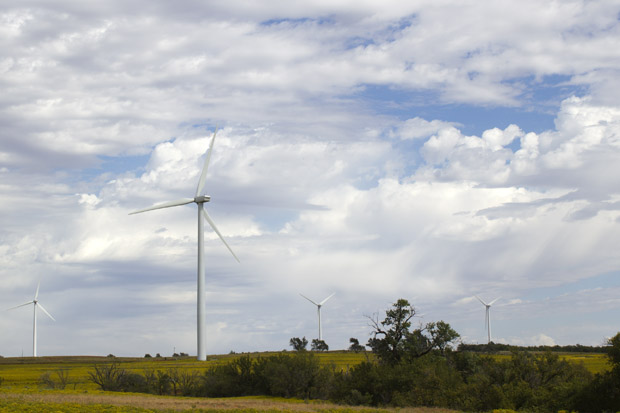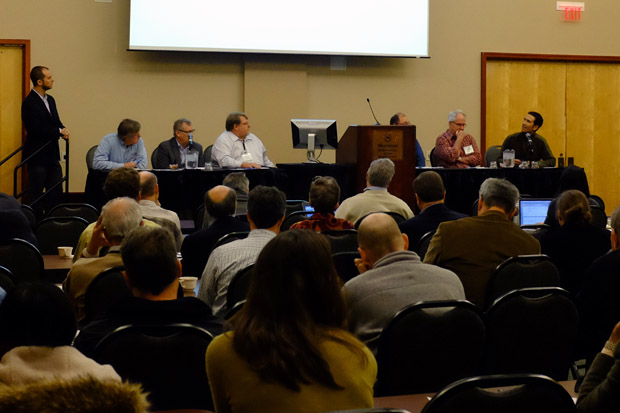“Federal Authorities Seek Immediate Halt to Osage County Wind Development”
U.S. Attorney Danny C. Williams requested the injunction this week, The Tulsa World reports.
U.S. Attorney Danny C. Williams requested the injunction this week, The Tulsa World reports.

Joe Wertz / StateImpact Oklahoma
A NextEra Renewable Energy Resources wind farm site near Elk City, Okla.
The 2015 session is still months away, but the newly elected Oklahoma Legislature has already started talking about how to divvy up roughly $7 billion in state appropriations.
Some prominent lawmakers are promising to re-examine tax credits and economic incentives worth hundreds of millions of dollars. Some of those incentives are used for wind energy, which the industry says are working.
Continue ReadingThe U.S. Environmental Protection Agency’s proposal for stricter ozone standards has been praised by environmentalists as a step in the right direction and derided by industry groups, which argue the rules will cost jobs and lead to higher prices for electricity and natural gas.
In Oklahoma, local government officials say tougher rules aren’t needed because ozone levels are already improving, and the state Department of Environmental Quality says the state would have a hard time meeting the proposed rules, which would reduce ozone standard from 75 parts per billon to between 65 and 70. Continue Reading
The cost of producing and providing electricity generated by solar panels and wind turbines has plunged in recent years, and are on track to meet — and in some markets are already beating — the generation costs of conventional sources like coal and natural gas.
Price parity has been a “long-held dream” of the solar and wind industries, The New York Times‘ Diane Cardwell reports. And alternative energy is proving competitive to conventional energy sources — especially in Oklahoma:
In September, the Grand River Dam Authority in Oklahoma announced its approval of a new agreement to buy power from a new wind farm expected to be completed next year. Grand River estimated the deal would save its customers roughly $50 million from the project. Continue Reading
A new turbine has been installed in Osage County, but the Osage Tribe is pledging continued court challenges as uncertianty over proper permits stemming from disctrict court rulings and Bureau of Indian affairs decisions lingers.

Joe Wertz / StateImpact Oklahoma
A panel of state geological surveys and oil and gas regulators at the National Seismic Hazard Workshop on Induced Seismicity, held in November at a conference center in Midwest City, Okla.
Scientists, regulators and technical experts from the energy industry met in Oklahoma to discuss how earthquakes triggered by oil and gas operations should be accounted for on national seismic hazard maps, which are used by the construction and insurance industries and pubic safety planners. Continue Reading
Supporters say the 487-mile section of the Keystone pipeline that connects Oklahoma to Texas is “proof that building the rest of the pipeline will create jobs and boost tax revenues,” but detractors say the economic impact is overstated and the pipeline will dramatically increase greenhouse gas emissions “by enabling Canadian producers to develop more oil sands crude.”
Tax breaks for the energy industry reduced state revenue collections by $486 million in 2014, Oklahoma Watch reports.
Six months after the Osage County Board of Adjustment “refused to grant a permit for a second wind farm development across the rolling hills of Osage County, a district judge declared Wednesday that the giant turbines must be approved after all,” The Tulsa World reports.

Crystal J. Hollis / Flickr
A Frack Free Denton booth at the University of North Texas. On Nov. 4, voters approved a citywide ban on hydraulic fracturing.
Driven by water worries, safety questions and quality of life concerns, residents in Oklahoma and states other the country have pushed for citywide bans on hydraulic fracturing.
Many of those efforts have proved successful, but, in the end, fracking bans might be more about lawyers than voters.
Continue ReadingStateImpact seeks to inform and engage local communities with broadcast and online news focused on how state government decisions affect your lives.
Learn More »